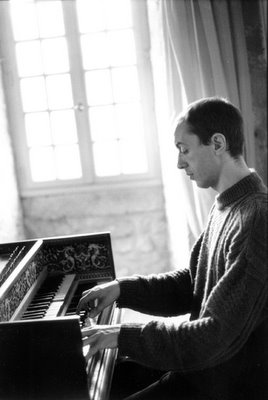Destouches, Callirhoé
 Hervé Niquet's early music group Le Concert Spirituel has recently begun a three-year period of residence at the Opéra National de Montpellier, with a staged performance of a rarely heard opera by André-Cardinal Destouches (1672-1749), Callirhoé (1712/rev. 1743). Jean-Louis Validire published an interview (Les jours heureux d'Hervé Niquet à Montpellier, February 7) with Niquet in Le Figaro (my translation):
Hervé Niquet's early music group Le Concert Spirituel has recently begun a three-year period of residence at the Opéra National de Montpellier, with a staged performance of a rarely heard opera by André-Cardinal Destouches (1672-1749), Callirhoé (1712/rev. 1743). Jean-Louis Validire published an interview (Les jours heureux d'Hervé Niquet à Montpellier, February 7) with Niquet in Le Figaro (my translation):
In what spirit do you embark on this adventure in Montpellier?
It is with satisfaction that I state that in today's world having a Baroque orchestra in residence is a necessary condition for an opera house to be respectable. In Montpellier, René Koering, who programs works by practically unknown composers, is showing that if the public is educated and generally curious, you can make a season consisting of something other than Beethoven, Rossini, and Verdi. He saw clearly that having an ensemble in residence was not only an obligation to benefit from having the label of a national opera, but also pleased the audience. We are lucky to have an opera director who is a pianist, a conductor, a composer, who therefore knows how to read a score, which is rare in France!
How can an ensemble like yours survive today?
None of Concert Spirituel's projects would happen without the unfailing support of its two patrons, the Fondation BNP Paribas and the Fondation BRU, who have backed us since the beginning, that is, for 19 years, and that's rare enough for me to underscore it. It is thanks to them the Le Concert Spirituel is able to record little-known works of the French Baroque, notably this year three unknown works, Destouches's Callirhoé, Lully's Proserpine, and Marais's Sémélé. The residency is indispensable for our survival. We have to get beyond the image of sacred music, which is our trademark in France and abroad.
Christophe Rousset at Drottningholm, Rameau's Zoroastre (August 17, 2005) Christophe Rousset, J. C. Bach's Temistocle in Toulouse (July 13, 2005) Cavalli, La Calisto, in Munich (May 21, 2005) Monteverdi's Poppea, Opéra national de Paris (February 5, 2005) Monteverdi's Poppea, Les Arts Florissants, Opéra national de Lyon (January 28, 2005) Monteverdi's Poppea, René Jacobs, Concerto Vocale, Théâtre des Champs-Elysées (October 24, 2004) |
Nicolas Pierchon wrote a review (Callirhoé sans émotion, February 7) of Callirhoé for ResMusica.com (my translation):
The story of Callirhoé is taken from the Description of Greece by Pausanias. Callirhoé is the daughter of the Queen of Calydon. She loves Agénor, whom she believes has been killed in battle, and is going to marry Corésus, high priest of Bacchus. But Agénor comes back. Callirhoé still wants to do her duty but faints during the wedding ceremony when she sees her lover. When Corésus unmasks the lovers, he sets fire to the city and starts killing people. The queen consults the oracle to find out how to re-establish peace. Peace can return only with Callirhoé's blood or with that of a lover who offers himself in her stead. Agénor and Callirhoé both want to die, each to save the other. Seeing that, Corésus sacrifices himself.The reviewer did not like the production itself -- especially the costumes, which "are a cross between Crouching Tiger, Hidden Dragon and Star Wars" -- and even wondered if a staged version was necessary after the concert performance. The article has some nice pictures of the production. The Concert Spirituel is planning to release a recording of the opera.
It was Hervé Niquet who exhumed the piece and performed it last year in Beaune, then in Versailles, in a concert version. We appreciate his choice to perform the 1743 version and not the 1712 one. In effect, Destouches revised the work at that point, cutting lines and airs, shortening the recitatives to avoid unnecessary length. Finally, he reworked the harmonic progressions in order to obtain the fuller harmony favored at the time, in the spirit of Rameau.





















































No comments:
Post a Comment